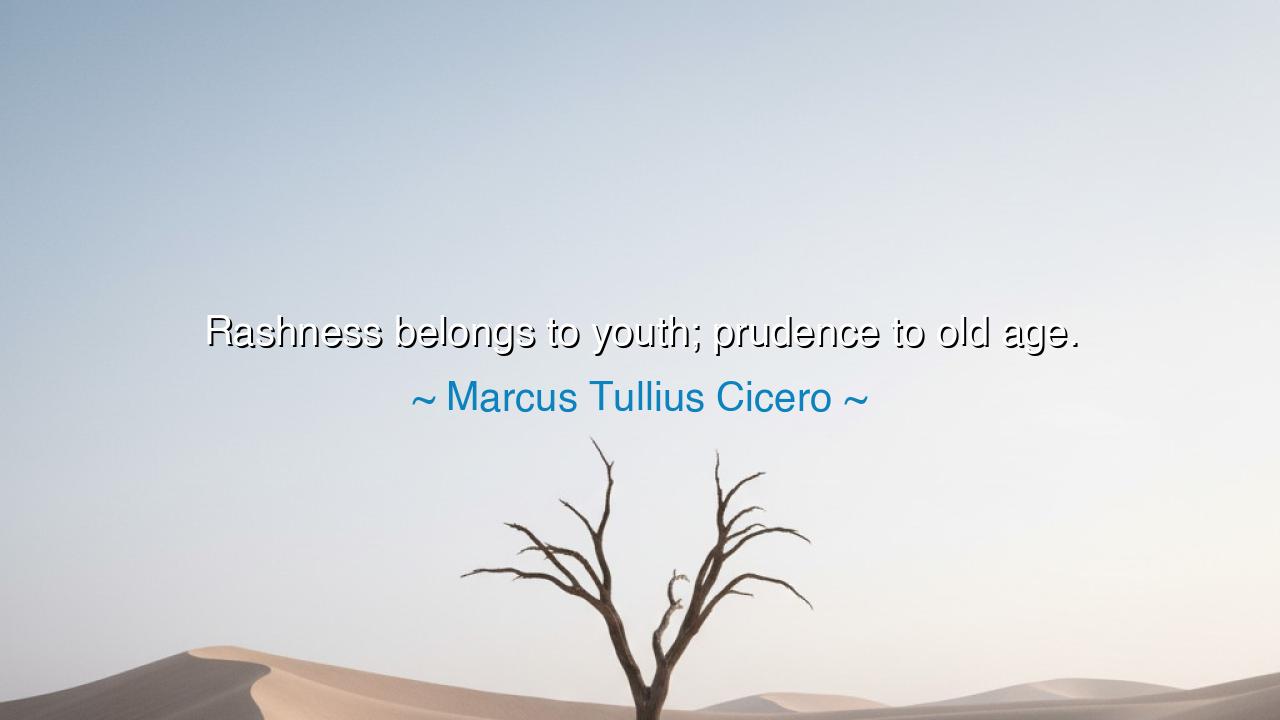
Rashness belongs to youth; prudence to old age.






In the great ebb and flow of life, there are few truths more evident than the contrast between youth and old age. The great Marcus Tullius Cicero, one of Rome's most revered philosophers and statesmen, spoke to this eternal truth when he declared, “Rashness belongs to youth; prudence to old age.” These words hold within them a deep understanding of the nature of human growth and development, and how the very passage of time transforms the way we approach the world. Rashness, a trait often associated with the unrestrained spirit of the young, is the fiery impulse to act without full consideration. Prudence, on the other hand, is the steady hand of wisdom and caution, cultivated through years of experience and reflection.
What, then, is the meaning of rashness in youth? It is not necessarily a flaw, but rather a natural part of the youthful spirit. In the fire of youth, the soul is untamed, driven by the desire to explore, to challenge, and to create. Young people, full of energy and ambition, often rush headlong into situations without considering the consequences, believing that their strength and resolve will carry them through. The young are daring, eager to test the limits of their own abilities and of the world around them. Their rashness is the spark that ignites new ideas, new revolutions, and new paths, even if it sometimes leads to unforeseen chaos. But such actions, while bold and uncalculated, often serve as the seedbed for learning—for it is through mistakes and unplanned endeavors that the greatest growth occurs.
Consider the story of Alexander the Great, whose youth was marked by boldness and unrestrained ambition. By the age of 20, Alexander had already set his eyes on conquering the known world, charging into battle without hesitation, driven by his youthful vision of an empire that stretched from Greece to India. His early campaigns were filled with rash decisions, such as the conquest of Persia and the destruction of its ancient empire. While these actions often seemed reckless, they were also a testament to his fearlessness and willingness to push beyond the boundaries of what had been thought possible. It was his youthful rashness that propelled him to conquer lands and achieve a level of greatness that few could match.
But as Cicero wisely notes, prudence—the wisdom that comes with the passage of time—belongs to old age. As the years accumulate, so too does the understanding that action without reflection can be dangerous. Prudence is the careful consideration of consequences, the ability to weigh one’s options and choose the path that is not only wise but also just and sustainable. It is the cooling of passion that comes with experience, the ability to discern between what is immediate and what is lasting. The wisdom of old age lies not just in the accumulation of years, but in the lessons learned through failure, loss, and contemplation.
Consider the figure of Socrates, whose later years were defined not by rash action, but by deep philosophical reflection. Socrates, though no stranger to boldness in his youth, spent his later years questioning the very foundations of morality, society, and truth. His prudence came not from avoiding action, but from carefully considering the impact of his words and deeds. His method was one of deliberation, of guiding others to self-reflection through thoughtful dialogue rather than through hasty judgments. Socrates taught that wisdom comes not from acting impulsively, but from understanding the consequences of one’s actions and choosing the path of virtue over the path of desire.
Thus, we see in the contrast between rashness and prudence the journey of human development. The youthful spirit, filled with ambition and passion, seeks to conquer the world without hesitation, while the older and wiser individual learns to approach life with greater care and consideration. The youthful impulse to act is vital—it drives progress, innovation, and change. Yet, without the balance of prudence, the fire of youth can burn too brightly, leading to destruction rather than creation. It is only with time that we come to understand the importance of pausing, reflecting, and choosing the course that will lead to lasting peace and growth.
The lesson for us is clear: there is value in both rashness and prudence, but they must be balanced. Youth must embrace the boldness of action, but with an awareness that time will teach them the importance of reflection. Old age must offer its wisdom and guide the young, not by suppressing their energy, but by teaching them to temper their actions with foresight and reflection. The true measure of a life well-lived lies in the ability to blend these two forces: the fire of youthful rashness and the steady hand of elderly prudence.
So, let us all strive to be both daring and wise—bold in our actions, yet thoughtful in our reflections. Let us recognize the power of youthful ambition, and guide it with the prudence of experience, so that we may build not only a life of success, but one of lasting significance. As Cicero’s words remind us, life is not about avoiding mistakes, but about learning from them, about growing with each step, and about finding the balance between the impulsive energy of youth and the reflective wisdom of age. Only then can we walk the path of true greatness.






AAdministratorAdministrator
Welcome, honored guests. Please leave a comment, we will respond soon